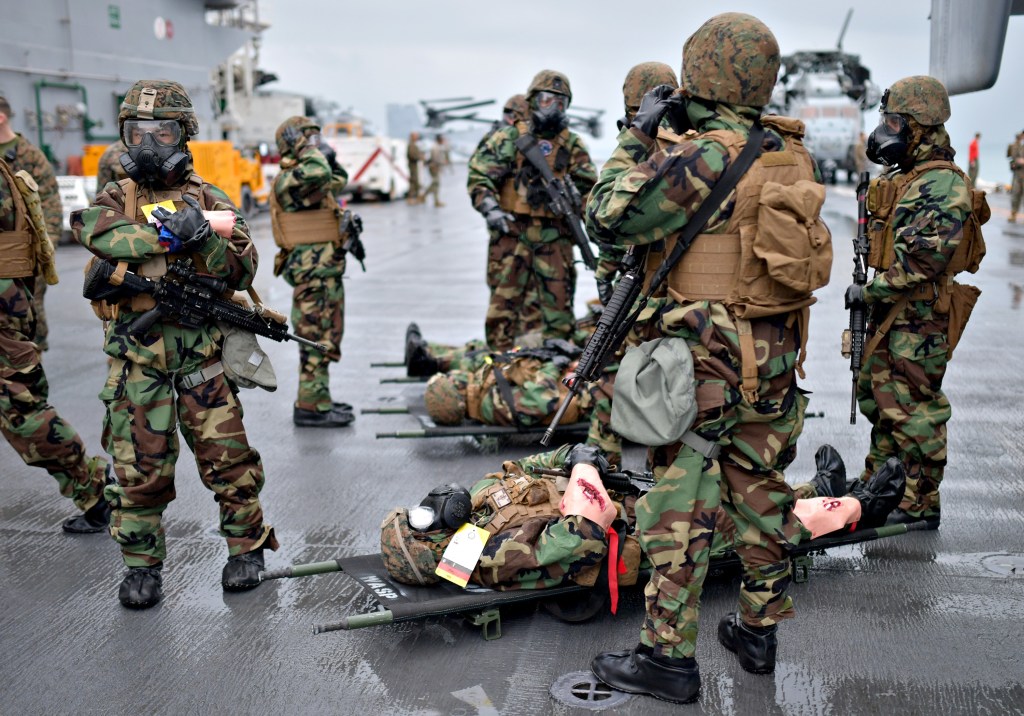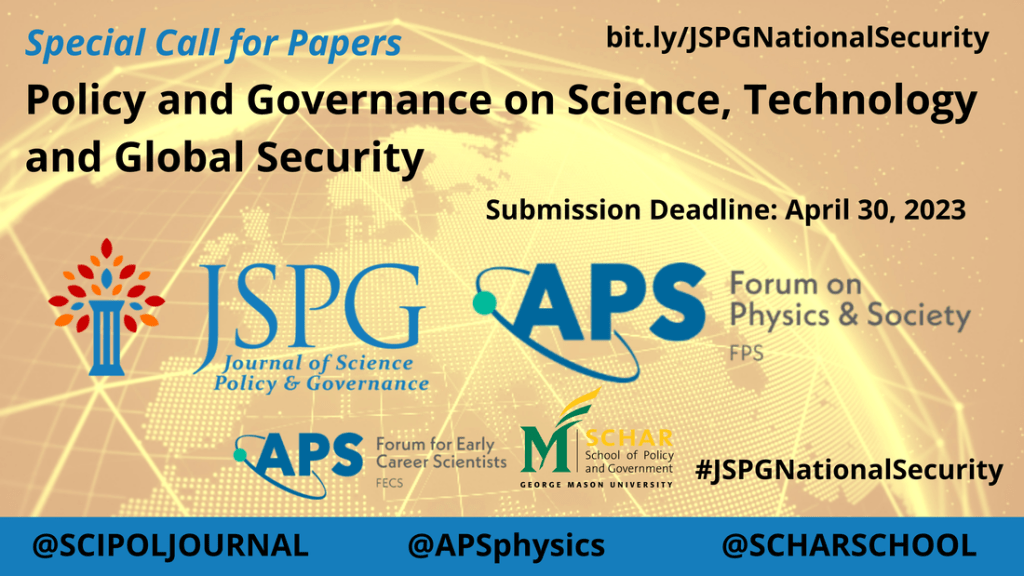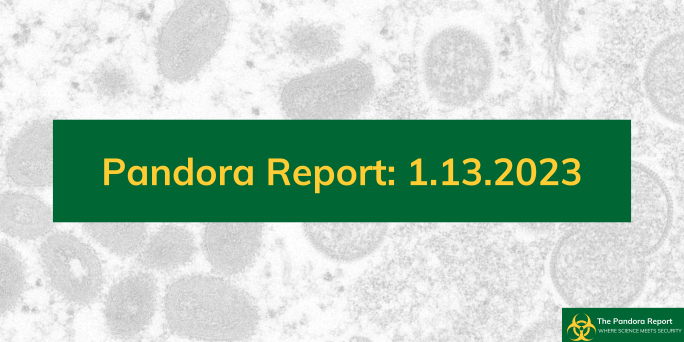Happy Friday! This week we cover DoD’s upcoming chem-bio defense changes, a recent accelerated preview from researchers at Boston University’s NEIDL, the arrest of an Iranian man in Germany on suspicion of planning an attack using ricin and cyanide, and more. We also include several new publications and podcasts, including our own Dr. Saskia Popescu’s piece about her experience catching COVID-19 as an epidemiologist working in infection prevention. We also have new events listed, including an upcoming Schar School graduate open house where you can learn more about the Biodefense Graduate Program. Stay safe and enjoy the MLK Day weekend!
Pentagon to Overhaul Chem-Bio Defense Despite Budget Trimming
Amid anticipation of the release of its first biodefense posture review, the Department of Defense (DoD) announced this week it is overhauling its approach to countering chemical and biological weapons. In a new document, “Approach for Research, Development and Acquisition of Medical Countermeasures and Test Products,” the Office of the Deputy Assistant Secretary of Defense for Chemical and Biological Defense explains that the Chemical and Biological Defense Program will expand the foci of its medical countermeasure development efforts. According to Politico, rather than continuing to focus on developing countermeasures for a specific list of threat agents, “Officials are launching a new plan to develop medical treatments, vaccines and personal protective equipment that can adapt to a range of evolving biological and chemical threats, said Ian Watson, DoD’s deputy assistant secretary for chemical and biological defense.”
Politico continued, quoting Deputy Assistant Secretary of Defense for Chemical and Biological Defense Ian Watson-“U.S. officials are particularly concerned about adversaries that already have advanced chemical and biological capabilities and have proven themselves willing to use them. Russia and China now have the technology necessary both to tweak current threats — from toxins to naturally occurring pathogens — to make them more deadly and to create new weapons, Watson said.”

The same article referenced Biodefense Graduate Program Director Dr. Gregory Koblentz, explaining “Gregory Koblentz…said the decision by the administration to look more holistically at chemical and biological threats is a strategic national security decision — one that could help the U.S. keep pace with countries such as China, Russia and Iran.” Koblentz was quoted later, saying “There’s definitely a much higher kind of salience and appreciation of how nation-states are using these technologies,” Koblentz said. “Until fairly recently, the focus has mostly been on ISIS and Al Qaeda using chemical and biological terrorism. This [strategy] might be another kind of paradigm shift.”
However, this announcement comes amid cuts to DoD’s chem-bio program funding overall. Roll Call reported recently that the nearly $2 billion in funding dedicated to all these programs will be cut by about $126 million, even in light of their comparatively slow growth and concerns brought about by the COVID-19 pandemic. Furthermore, the Chemical Biological Defense Program received $1.26 billion in appropriations in the last omnibus spending bill-$66 million less than was requested.
Roll Call discussed these funding concerns with Andrew Weber, former Assistant Secretary of Defense for Nuclear, Chemical & Biological Defense Programs under President Obama, and David Lasseter, former Deputy Assistant Secretary of Defense for Countering Weapons of Mass Destruction under President Trump and a visiting fellow at George Mason’s National Security Institute. Both indicated the funding for these programs needs to more than double, with Lasseter saying “Increasing the current investment to around $3 billion per year, while ensuring efficient and effective program execution, will enable the CBDP to develop cutting-edge capabilities like rapid, ruggedized point-of-care diagnostics, stand-off detection, predictive wearables, advanced protective suits and innovative platform technologies as well as stock and replenish existing medical countermeasures.”
It isn’t all doom and gloom, however. Check out this recent post from George Mason University about a Mason research team’s work to help USAMRIID find broad-spectrum therapeutics for to treat HFV infections-“Mason Collaboration Receives $3.2 million to Help Military Personnel Combat Hemorrhagic Diseases”
Months After Firestorm Surrounding SARS-CoV-2 Experiments, NEIDL Publishes Article on BA.1 Attenuation
In late October, news and social media were full of debate regarding a preprint authored by researchers at Boston University’s National Emerging Infectious Diseases Laboratories. As Science explained at the time of the controversy, “They took the gene for Omicron’s surface protein, or spike protein, which SARS-CoV-2 uses to enter cells and added it to the genome of a “backbone” virus—a variant of SARS-CoV-2 from Washington state that was identified soon after the pandemic first emerged in Wuhan, China, in early 2020. The objective was to tease apart whether Omicron’s spike protein explains why it is less pathogenic (meaning it causes less severe disease). The answer could lead to improved COVID-19 diagnostic tests and better ways to manage the disease, the preprint authors say.” As there had been no approval from NIAID, debates swirled over the benefits and safety of the research, and if it violated rules on NIH-funded gain of function (GoF) studies.
Now the same team has published an article that is available for accelerated preview in Nature, again attracting attention and sparking debate. This comes amid broader debates about risky research, including GoF research itself and calls to broaden definitions of what kinds of experiments require special reviews and safety measures. In April last year, Biodefense Graduate Program Director Dr. Gregory Koblentz delivered a statement addressing this topic to the NIH, highlighting the problems the term “gain of function” has brought in policy debates. In his remarks regarding the Department of Health and Human Services Framework for Guiding Funding Decisions about Proposed Research Involving Enhanced Potential Pandemic Pathogens, Koblentz said “The first positive aspect of the Framework is that it does not use the term “gain of function.” The introduction of this term into the discussions on dual-use research in 2011-2012 triggered a long and unproductive debate about how to define this category of research. Carving out “gain of function” as somehow distinct or separate from dual-use research muddied the debate and continues to cause confusion today.”
This topic recently garnered attention again as the omnibus appropriations bill progressed through Congress before being signed into law by President Biden. As we discussed last week, the new legislation also takes aim at GoF research, after GOP lawmakers pushed the administration to halt federally-funded GoF research, citing beliefs that such research is responsible for the COVID-19 pandemic. On page 3,354 of the more than 4,100 page bill, it reads, “(1) IN GENERAL.—Beginning not later than 60 days after the date of the enactment of this Act, the Secretary of Health and Human Services shall not fund research conducted by a foreign entity at a facility located in a country of concern, in the estimation of the Director of National Intelligence or the head of another relevant Federal department or agency, as appropriate, in consultation with the Secretary of Health and Human Services, involving pathogens of pandemic potential or biological agents or toxins listed pursuant to section 351A(a)(1) of the Public Health Service Act (42 U.S.C. 262a(a)(1)).” It also requires the Office of Science and Technology Policy to review and update federal policy on potential pandemic pathogen research.
German Police Detain Iranian Man Accused of Plotting Attack, Acquiring Cyanide and Ricin
This week, Deutsche Presse-Agentur (DPA) reported that German police arrested a 32-year-old Iranian man on suspicion of planning an attack motivated by Islamic extremism. Police wearing protective gear entered the man’s apartment in Castrop-Rauxel, northwest of Dortmund, late Saturday night. According to Herbert Reul, State Minister for Internal Affairs, the police acted on a “serious tip” that prompted them to respond the very night they received it. News reports indicate that an allied intelligence service alerted Germany that the man was planning an attack. Though he is thought to have acquired cyanide and ricin, it is unclear how developed his plan was. However, Düsseldorf prosecutors later told DPA that “no toxic substances” were found in the initial search of the apartment.
Outgoing Eskom CEO Survives Cyanide Poisoning
Andre de Ruyter, the outgoing CEO of Eskom-South Africa’s state-owned electricity company-, reportedly survived an attempt to poison him with cyanide last month. De Ruyter, who will step down in March, fell ill after he was served a cup of coffee laced with the agent on December 12. According to Insider, “After drinking the coffee, De Ruyter became “weak, dizzy, and confused,” EE Business Intelligence reported, citing an unnamed source. He was shaking, vomiting, and eventually collapsed, the source said. The Financial Times reported sources as saying that De Ruyter was nauseous and became confused after the drinking the coffee. According to the FT, the coffee machine at Eskom’s office was out of order at the time of the incident, and he was served a coffee from a different source.”
The same news report also explained that, “Since taking over as CEO of Eskom, De Ruyter has attempted to crack down on corruption within South Africa’s energy sector, EE Business Intelligence reported. He has, however, also clashed with the country’s government, and in December, Eskom was accused of “actively agitating for the overthrow of the state” by South Africa’s energy minister Gwede Mantashe.”
Prison Colony Where Alexei Navalny is Held Suffers Flu Outbreak
Alexei Navalny, the prominent Putin critic who survived an attempted poisoning in 2020, is reportedly in worsening health amid a flu outbreak in the colony he is held in east of Moscow. Navalny claims that prison authorities intentionally placed a man sick with influenza next to him as a “bacteriological weapon,” and that he has been denied basic medications despite suffering a fever and cough. Last month, Navalny said he suffers from worsening back pain from long periods of time spent in the colony’s punishment cell and that he has been injected with multiple unknown drugs. He has also Tweeted through his lawyers that the authorities intentionally moved a mentally unstable man who howls at night into a cell near him.
Though his current symptoms are not life-threatening, there is speculation that this could be part of a deliberate attempt to make Navalny, Putin’s most out-spoken domestic supporter, die from natural causes. The Schar School’s Dr. Mark N. Katz, an expert on Russia, told Newsweek “”If Putin had wanted Navalny dead, he could have easily arranged for this.” He added “Putin may think he’ll be better off if Navalny dies from illness than directly at the hand of the state.” Russia denies any role in the 2020 attack against Navalny, which used a Novichok agent, a group of nerve agents developed in the Soviet Union. Navalny is currently serving an 11.5 year prison sentence on trumped up charges supporters say were created to silence him.

“Understanding Biosafety and Biosecurity in Ukraine”
Biodefense PhD student Ryan Houser, Biodefense Graduate Program Director Dr. Gregory Koblentz, and Dr. Filippa Lentzos of King’s College London recently published this piece in Health Security. Their abstract reads: “The Russian invasion of Ukraine in February 2022 was accompanied by unfounded Russian allegations of bioweapon activities in Ukraine conducted by the United States and its allies. While false, such allegations can cause substantial damage to disarmament efforts and international cooperation for strengthening disease surveillance and global health security. The purpose of this article is to describe Ukraine’s biosafety, biosecurity, and dual-use policies and to provide important context for understanding the unwarranted Russian allegations. Moreover, the analysis of Ukraine’s biorisk management system highlights some of the international efforts underway to ensure that life sciences research across the world is conducted safely, securely, and responsibly. With the help of international partners, Ukraine has strengthened its biorisk management governance, as well as identified areas for improvement that it is working to address.”
“When the Infection Prevention Epidemiologist Gets COVID-19”
In this piece for Infection Prevention Today, Biodefense PhD Program alumna and current Schar School Assistant Professor, Dr. Saskia Popescu, discusses what it was like to catch COVID-19 in late 2022 as someone working in infection prevention. She offers insights into the pressures and guilt that many professionals have grappled with throughout this pandemic, writing “Safety isn’t binary, but rather a spectrum of risk and choice, and ultimately, it’s important to consider those individuals around us. I wish I would have been more vigilant in masking but am grateful I had the resources and capacity to mask and isolate appropriately when symptoms began. A friend recently joked that I had lost my street “cred” as an infection preventionist, which was both comical and a bit eye-opening. Mostly, it highlights much of the guilt or even shame many of us experience when we feel as if we’ve failed at the very thing we specialize in. I still beat myself up at times for getting COVID-19 and knowing better as an infectious disease specialist, but I also don’t want to associate any sense of shame with an infectious disease. We have all learned lessons during this pandemic, and a sustainable approach to COVID-19 will likely be one of the most important in the greater context of public health and infectious disease response.”
“Building the CDC the Country Needs”
The Center for Strategic & International Studies recently published this report by Drs. J. Stephen Morrison and Tom Inglesby discussing the current state of CDC and the findings of the CSIS Commission on Strengthening America’s Health Security’s review of the agency. They explain, “This CSIS report enumerates the essential, concrete, near-term steps that will return CDC to a pathway of high performance: clarifying and better integrating CDC’s core domestic and global missions; enhancing CDC’s leadership and transparency by bolstering its communications and federal engagement capacities; creating a much stronger competency in Washington; and bolstering its operational and surge capabilities through updated frontline engagement, workforce development, data analysis, and budget flexibility. Across all reforms, greater attention to equity and accountability will be essential.”
“The Global Risks Report 2023”
In the 18th edition of the Global Risks Report, the World Economic Forum discusses the findings of the latest Global Risks Perception Survey. The report addresses current crises, risks that are likely to be severe in the next decade, and mid-term future challenges centered around natural resource shortages. It finds that the cost of living will continue to dominate global risks in the next two years while failure to mitigate climate change will be the defining issue of the next decade, leading a formidable list that includes other issues like geoeconomic confrontation and widespread cybercrime and cyber insecurity.
What We’re Listening To 🎧
The BWC Global Forum: Biotech, Biosecurity & Beyond
This podcast series from the Johns Hopkins Center for Health Security aims to “…support BWC States Parties, policymakers and policy experts, and scientists understand advancements in biology and biotechnology and their impact on the Biological & Toxin Weapons Convention (BWC).” Currently, episodes include “De-Extinction Technologies”, “Human Genome Editing”, and “Wastewater Surveillance”. Learn more and listen here.
The Retort Episode 7-Toxin and Bioregulator Weapons
In this latest episode of the Retort, the University of Bath’s Dr. Brett Edwards discusses toxin and bioregulator weapons with Drs. Lijun Shang and Malcolm Dando. Check it out here.


George Mason Arlington Graduate Open House
Join us for the Graduate Open House on Thursday, January 19, from 5-7 p.m. on George Mason University’s Arlington Campus to learn more about the Biodefense Program and 40+ other programs from the Schar School of Policy and Government, the School of Business, and the Carter School for Peace and Conflict Resolution. At the in-person event, explore your graduate school options, connect with our representatives, and find out where a Mason graduate degree can take you next. Come early and work on your application with us! A computer lab is reserved starting at 4:30 p.m. for you to start your application and staff members will be on hand to answer your questions. Register today!
Opportunities, Threats and Proliferation Challenges Deriving from Bio-Technology and Bio-Engineering
“The International Affairs Institute (IAI) of Rome and the Vienna Center for Disarmament and Non Proliferation (VCDNP) cordially invite you to attend the next Young Women and Next Generation Initiative (YWNGI) public webinar event entitled: “Opportunities, Threats and Proliferation Challenges deriving from Bio-Technology and Bio-Engineering” which will be held on 16th January 2023 from 3:00 to 4:30 p.m. Central European Time (CET) via Zoom.
The webinar will feature remarks by Dr Angela Kane, former UN High Representative for Disarmament Affairs and Senior Fellow at the Vienna Center for Disarmament and Non Proliferation (VCDNP); Dr Filippa Lentzos, Associate Professor in Science & International Security at King’s College London; and Dr James Revill, Head of the WMD and Space Security Programmes at the United Nations Institute for Disarmament Research (UNIDIR).” Learn more and register here.
Wastewater-Based Disease Surveillance for Public Health Action
“The National Academies’ Water Science and Technology Board and Health and Medicine Division invite you to a public release webinar of “Wastewater-Based Disease Surveillance for Public Health Action,” on Thursday, January 19, 2023 from 2-3 p.m. ET. The report explains how community-based wastewater disease surveillance has been useful during the COVID-19 pandemic in helping to inform important public health decisions. It also examines the value of wastewater surveillance applications for other infectious diseases, and presents a vision for the future of wastewater surveillance on a national scale.” Learn more and register here.
Closing the Knowledge Gaps
“BIO-ISAC, in partnership with the Department of Homeland Security and Johns Hopkins Applied Physics Laboratory, will host a one-day event (with remote participation available) on January 24, 2023.”
“This gathering of thought leaders across the industry and its partners will address knowledge gaps about the bioeconomy itself. The event is expected to deliver recommendations that demonstrate the scope and breadth of industry impacts, identify specific safety needs and goals, and carve the path forward for a secure future.” Learn more and register here.
Novel Applications of Science and Technology to Address Emerging Chemical and Biological Threats
For the first time since 2019, this Gordon Research Conference is back, this time in sunny Ventura, CA. “The Chemical and Biological Defense GRC is a premier, international scientific conference focused on advancing the frontiers of science through the presentation of cutting-edge and unpublished research, prioritizing time for discussion after each talk and fostering informal interactions among scientists of all career stages. The conference program includes a diverse range of speakers and discussion leaders from institutions and organizations worldwide, concentrating on the latest developments in the field. The conference is five days long and held in a remote location to increase the sense of camaraderie and create scientific communities, with lasting collaborations and friendships. In addition to premier talks, the conference has designated time for poster sessions from individuals of all career stages, and afternoon free time and communal meals allow for informal networking opportunities with leaders in the field.” The conference will be held March 19-24, 2023. Learn more and apply here by February 19.

Special Call for Papers-Journal of Science Policy & Governance
The Journal of Science Policy & Governance recently announced a special call for papers “and competition to provide policymakers with a new perspective on how scientific expertise could be useful to the complex brew of 21st foreign policy and national security challenges, resulting in a special issue on Policy and Governance on Science, Technology and Global Security.” The journal invites “students, post-doctoral researchers, policy fellows, early career researchers and young professionals from around the world to submit op-eds, policy position papers and other articles addressing foreign policy and national security challenges. These include concerns about the use of nuclear or radiological weapons driven by the war in the Ukraine, hypersonic weapons, immigration driven by climate change, and emerging threats in cybersecurity and biosecurity.” The deadline for submission is April 30.
Additionally, there will be a science policy writing workshop on January 30 in addition to two webinars on February 20 and March 30 (one on Policy and Governance on Science and Technology and one on Foreign Policy and National Security, respectively) to help prospective authors prepare their submissions. Learn more about these events and register here.

Weekly Trivia Question
You read the Pandora Report every week and now it’s time for you to show off what you know! The first person to send the correct answer to biodefense@gmu.edu will get a shout out in the following issue (first name last initial). For this week, our question is “In 1980, a Frenchman entered a cave while visiting Mount Elgon National Park, Kenya. A week later he became seriously ill, eventually dying in a Nairobi hospital. Which cave did he enter and what disease killed him?”
Shout out to Stephen M. for winning last week’s trivia! The correct answer to “Before perpetrating the infamous Tokyo subway sarin attack in 1995, this Japanese cult attempted to disseminate botulinum neurotoxin and Bacillus anthracis, among other agents. What was the name of this cult prior to its split/name change in 2007?” is Aum Shinryko.

